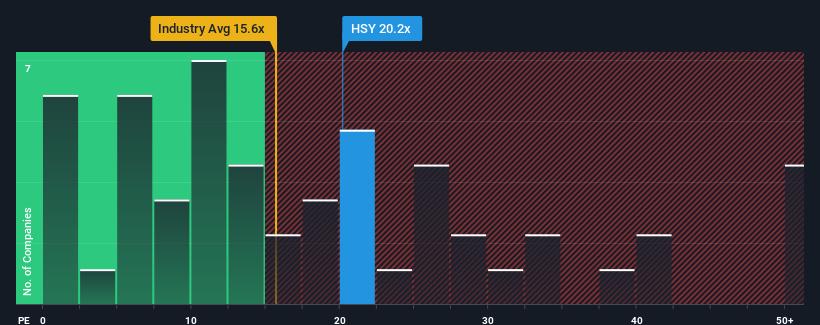When close to half the companies in the United States have price-to-earnings ratios (or "P/E's") below 16x, you may consider The Hershey Company (NYSE:HSY) as a stock to potentially avoid with its 20.2x P/E ratio. However, the P/E might be high for a reason and it requires further investigation to determine if it's justified.
Recent times have been pleasing for Hershey as its earnings have risen in spite of the market's earnings going into reverse. The P/E is probably high because investors think the company will continue to navigate the broader market headwinds better than most. You'd really hope so, otherwise you're paying a pretty hefty price for no particular reason.
View our latest analysis for Hershey

What Are Growth Metrics Telling Us About The High P/E?
In order to justify its P/E ratio, Hershey would need to produce impressive growth in excess of the market.
If we review the last year of earnings growth, the company posted a terrific increase of 21%. The strong recent performance means it was also able to grow EPS by 63% in total over the last three years. Accordingly, shareholders would have probably welcomed those medium-term rates of earnings growth.
Turning to the outlook, the next three years should generate growth of 6.3% per annum as estimated by the analysts watching the company. Meanwhile, the rest of the market is forecast to expand by 13% per annum, which is noticeably more attractive.
With this information, we find it concerning that Hershey is trading at a P/E higher than the market. It seems most investors are hoping for a turnaround in the company's business prospects, but the analyst cohort is not so confident this will happen. There's a good chance these shareholders are setting themselves up for future disappointment if the P/E falls to levels more in line with the growth outlook.
The Key Takeaway
While the price-to-earnings ratio shouldn't be the defining factor in whether you buy a stock or not, it's quite a capable barometer of earnings expectations.
Our examination of Hershey's analyst forecasts revealed that its inferior earnings outlook isn't impacting its high P/E anywhere near as much as we would have predicted. Right now we are increasingly uncomfortable with the high P/E as the predicted future earnings aren't likely to support such positive sentiment for long. This places shareholders' investments at significant risk and potential investors in danger of paying an excessive premium.
You should always think about risks. Case in point, we've spotted 1 warning sign for Hershey you should be aware of.
Of course, you might also be able to find a better stock than Hershey. So you may wish to see this free collection of other companies that have reasonable P/E ratios and have grown earnings strongly.
Valuation is complex, but we're here to simplify it.
Discover if Hershey might be undervalued or overvalued with our detailed analysis, featuring fair value estimates, potential risks, dividends, insider trades, and its financial condition.
Access Free AnalysisHave feedback on this article? Concerned about the content? Get in touch with us directly. Alternatively, email editorial-team (at) simplywallst.com.
This article by Simply Wall St is general in nature. We provide commentary based on historical data and analyst forecasts only using an unbiased methodology and our articles are not intended to be financial advice. It does not constitute a recommendation to buy or sell any stock, and does not take account of your objectives, or your financial situation. We aim to bring you long-term focused analysis driven by fundamental data. Note that our analysis may not factor in the latest price-sensitive company announcements or qualitative material. Simply Wall St has no position in any stocks mentioned.
About NYSE:HSY
Hershey
Engages in the manufacture and sale of confectionery products and pantry items in the United States and internationally.
Established dividend payer with adequate balance sheet.
Similar Companies
Market Insights
Community Narratives



